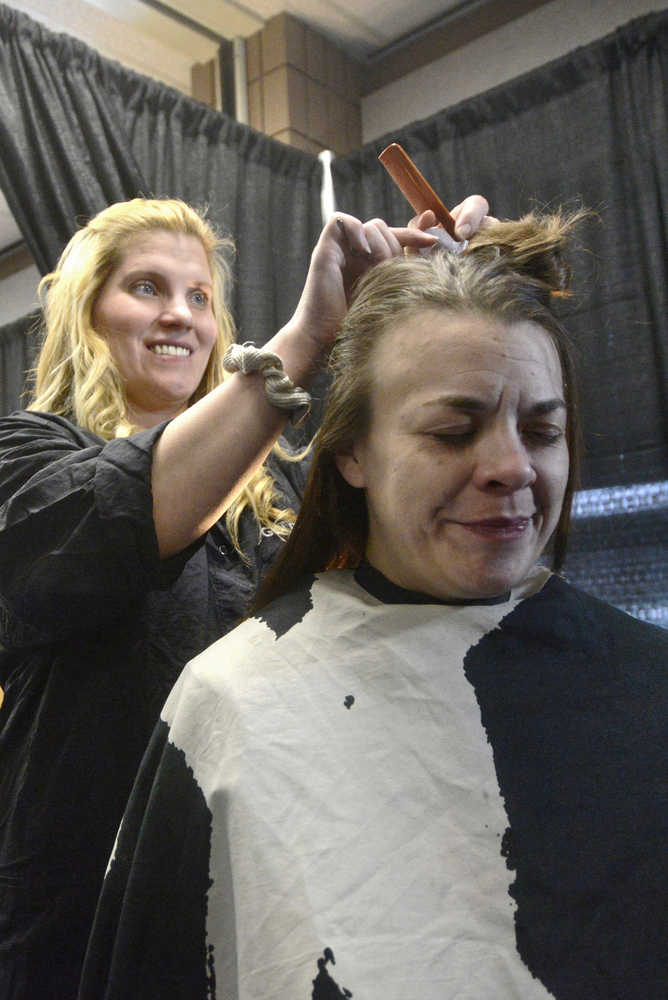Now gearing up for their sixth year of helping those without a home, organizers of Project Homeless Connect are finalizing plans and working on ways to more accurately identify just who needs the help.
The next Project Homeless Connect event will take place from 10 a.m. to 4 p.m. Jan. 24, 2017 at the Soldotna Regional Sports Complex. Organizers will provide free transportation to and from the event, which will feature a wide range of services and resources to help the Kenai Peninsula’s homeless and near homeless get back on their feet. Those who attend will have access to haircuts, winter clothing, meals, employment, veteran and mental health services and more.
According to a report put out by the Homeless Action Coalition, 123 individuals filled out intake forms at the 2016 Project Homeless Connect, a 38 percent increase from the previous year. However, the total number of people served through the most recent event was 213, based on the number of people reported per household, according to the report.
Of the people who filled out intake forms, 88 percent were not employed at the time. Another 86 percent of them were victims of domestic violence, the Homeless Action Coalition reported.
Organizers for Project Homeless Connect met in Kenai on Tuesday to continue planning the event and brainstorm ideas for how to get a more accurate count of the peninsula’s homeless population. The more homeless individuals that can be documented on the peninsula, the more federal funding resource providers are eligible to receive from the U.S. Department of Housing and Urban Development to help them.
Only 69 people were identified as homeless on the peninsula during the last point-in-time count, a measure of homelessness taken by documenting the number of people who report being without a home on a single given day, which aligns with the date of this year’s Project Homeless Connect. The data is then submitted to the U.S. Department of Housing and Urban Development.
The challenge of getting an accurate measure of homelessness during the point-in-time count was a focus of Tuesday’s meeting, with organizers suggesting ways to compile data collected in different ways by service providers and agencies. The Kenai Peninsula Borough School District’s Students in Transition program, for example, helps about 250 students across the peninsula during the school year, but that count is not included in the point-in-time data sent to the federal government, organizers said.
“There are a lot of reasons why homelessness and near homelessness exists, and it is not the picture of the person standing out on the street holding a sign,” said Jodi Stuart, the PR chair of Project Homeless Connect, during a presentation to the Soldotna City Council at its Nov. 9 meeting. “Although Soldotna does have that. If you haven’t seen them, just look. They’re there.”
Project Homeless Connect organizers brainstormed ways to visit the peninsula’s homeless communities before the actual event to let them know about both the count and the day of services.
Stuart has been making the rounds to public meetings to let local government bodies know about the upcoming event and to invite members of city councils to attend and learn more about the peninsula’s homeless population. She invited Soldotna council members to take part in the process and cited similar events around the country that put greater emphasis on involvement by local leadership.
“This allows city government and borough government to understand that maybe resources aren’t being utilized in the best way, because now they have the information from the people themselves,” Stuart said. “It allows us to continue to create community partnerships and it allows us to really collaborate.”
Stuart told council members that 47 percent of those who attended Project Homeless Connect in 2015 reported that they experience struggles like alcohol or drug abuse, disabilities and other health issues. Approximately 46 percent of the attendees at the 2016 event reported experiencing these things.
“These numbers are staying steady,” she said. “This means that the problem is not fixed. We have a problem with homelessness.”
Stuart called on members of the city council to join the organizers and volunteers of Project Homeless Connect during the January event. Rather than donating items or money, Stuart invited council members to eat lunch with the event participants and emphasized simply taking time to hear their stories and better understand them.
“We’re not hear to ask for funding, although we could probably use some. We’re not asking for, you know, stuff, although we could always give that stuff away,” she said. “What we’re asking for is for you to come and see what the problem is, and then hopefully join with us in some solution.”
To learn more about Project Homeless Connect, call (907) 420-4514 or send an email to kp_projecthomelessconnect@mail.com.
Megan Pacer can be reached at megan.pacer@peninsulaclarion.com.

